You’re listening to Burnt Toast! This is the podcast about anti-fat bias, diet culture, parenting and health. I’m Virginia Sole Smith.
Today I am chatting with author and feminist philosopher , about her new book Unshrinking: How To Face Fatphobia.
Kate is also an associate professor of philosophy at Cornell University and author of Down Girl: The Logic of Misogyny and Entitled: How Male Privilege Hurts Women.
In Unshrinking Kate has given us an impeccably researched history of how anti-fat bias developed and develops within us all, as well as a thorough and incisive dissection of our modern moral panic about fatness, all woven throughout with her powerful story of reclaiming her own body. If you have ever struggled to feel safe in your body as it is, if you have ever wondered who your body is for, Kate has the answers. Our bodies belong to us.
All of Kate’s books, including Unshrinking, are available in the Burnt Toast Bookshop!
Don’t forget, you can always take 10 percent off that purchase if you also order (or have already ordered!) Fat Talk from Split Rock Books! (Just use the code FATTALK at checkout.)
And if you love today’s conversation you should come see Kate and I together at Community Bookstore in Brooklyn on January 26. We’ll be celebrating the launch of Unshrinking and we would love to see you there!
If you’re enjoying the podcast, make sure you’re following us (it’s free!) in your podcast player! We’re on Apple Podcasts, Spotify, Stitcher, and Pocket Casts! And while you’re there, please leave us a rating or review. (We like 5 stars!)
Episode 125 Transcript
Kate
So I am a philosopher by trade. I’m an academic. Most of my work for the last 10 years, on paper at least, has been about misogyny. So I’ve been very much mired in thinking about incels, and thinking about the misogyny women face online, and thinking about ways in which women and girls face harassment, and the forms of misogyny that can be also very subtle on a daily basis. And in the last three years, I turned my attention to the intersection between misogyny and fatphobia or anti-fatness.
It’s kind of a dark topic to work on. But it’s also one I find kind of liberating to try to think through in community with others.
Virginia
We’re so grateful for your work.
We are talking about your new book Unshrinking, which explores how anti-fat bias develops in all of us. It is profoundly well researched, because everything you do is, but this is one where you’re also using your personal story of reclaiming your body and identifying as a fat person. So I wondered if we could, if you don’t mind, starting by just sharing a little bit of that now?
Kate
So, in this work that I have been doing on misogyny, people often want to know: Why did you get invested in this topic? And I have been unable to tell my story about how misogyny came to affect me personally, without telling a story about fatphobia. So to me, misogyny and fatphobia were crucially interconnected and intersected in this really deep way back when I was growing up in Australia. Because I was, at the age of 16, one of three girls who joined an all-boys school the year it integrated.
Virginia
You have told me that before and it will never not blow my mind.
Kate
It was such a strange decision to send me there. The backstory was, I wanted to do this special international baccalaureate certificate so that I could potentially come to the States to study, which didn’t end up happening for a bunch of reasons. But yeah, I was just someone who walked into this all male environment and was very much perceived as a girl who was on the boys’ hitherto undisputed turf. And so it was an incredibly misogynistic environment to be in. I think it’s fair to say, it was a really traumatic two years after a pretty happy childhood. And the way that the misogyny was often practiced was via fatphobia and by making my body a kind of punch line, a target for jeering and teasing and bullying, from the ostensibly littler things, like having fat bitch scrawled on my locker—
Virginia
Yeah, just those little things. Tiny, little micro aggression like that.
Kate
Yeah, kind of macro aggression when I say it out loud. I was just labeled the fat one, the fat girl who was undesirable, and who wasn’t serving male interest by not being quote, unquote “hot.”
So there was this particular incident that I talk about in the book, at the high school assembly where, you know, it’s always kind of horrifying. We had these prizes that are always awarded for “person most likely to commit white collar crime” and “person most likely to have children out of wedlock,” and all sorts of really actually noxious stuff that’s presented as a joke. But then they said, “and the person most likely to have to pay for sex is…” and I kind of braced myself ready for it. And sure enough, it was “that person is Kate Manne.” And the auditorium just roared with laughter. Because my body was a joke.
And I should say, I am speaking as someone who has a certain amount of privilege when it comes to size. I identify as a small fat person, I was at most a small fat at the time. And I can’t even imagine how horrifying the treatment would have been for someone who was a larger fat person.
But it was a really eye-opening way of being exposed to the sheer cruelty, as well as the material barriers that fat people face, and the way that misogyny weaponizes any hierarchy that’s ready to hand and derogates a girl a woman in terms of it. We value intelligence, so call her stupid. We value rationality, so call her hysterical. We value thinness, so call her fat. And we value sexiness, so call her the kind of person that no one could ever want.
That is how it came to be something that I became fascinated with because even though I knew the word misogyny, it wasn’t a word that I reached for to explain the kind of treatment I’d faced. Similarly, I didn’t even have a word like anti-fatness or fatphobia back at the age of 16. It wasn’t until a few years later that I discovered an online community of people who were really pushing back against anti-fatness. People like Kate Harding, people like Marianne Kirby and Lesley Kinzel, who I discovered in the early 2000s, doing this amazing work of reclaiming the bodies that had been so socially derogated partly through this intersection of misogyny and fatphobia that was my formative political experience.
And it’s an experience that I tried to get personal about in the book because I have found opening up about these things is a great way, for me at least, of finding community and finding other people who have similarly been shamed, who’ve been othered. It’s that moment when we can lift our heads and meet each other’s gaze that often feels really empowering and liberating, after having had our heads bowed in shame for so long.
Virginia
I had so many emotions when I read that scene in the book, and I’m revisiting them right now. I just really hope some of those boys who are now grown men read this book and feel in their hearts that they know what they did. I want them to have that moment of That was that was what I did. And I have to look at it.
So that is perhaps petty. But I am actively hoping for that.
Kate
I love that. That’s one of the reasons for this subtitle How to Face Fatphobia. Like, it’s not just me facing it. I want others who, you know, we’ve all been complicit in it to some extent, but those who have been really active in it. I have that same hope that it will be something that we collectively reckon with and face in ways. People who’ve often thought of themselves as kind and progressive and not complicit in oppression, have often perpetuated fatphobia in these ways that remain really under examined.
Virginia
I’m also thinking about how you didn’t even have the word of fatphobia or anti-fatness to name what you’re experiencing. That really was such a lack back then. I mean, it’s still a lack in too many places. And what it meant was that what we often did was to try to deny fatness. The counter argument would be, “She’s not even that fat. Why are you saying that about her?”
Kate
Completely. Imagine how liberating it would have been for someone to say to me, instead of, “well, you’re not really fat—” because I was kind of on the borderline at that stage—but “fat people are awesome and this is such a warped value system.”
And I was someone who had been raised with really strong, anti-racist values and was taught to recognize problems in society. So that critical thinking lens was something that I think could have been opened up and widened to include thinking about how irrational and immoral anti-fatness is, and also how it intersects with those forms of oppression that I had already been taught to be critical of.
When I came to the early 2000s fatosphere, it was this wild moment of wait, what if there’s nothing wrong with fatness? What if fat bodies are awesome and valuable and just as good and don’t need to change to comply with these values that are so noxious and oppressive? That was a lesson that I didn’t have any trouble digesting as a political message. It took me a long time to get there in my personal practices. But it was a political message I found so powerful and so resonant.
Virginia
I’d love to talk about some of the other big misconceptions around what it means to be anti-fat. You spend a lot of time in the book really eloquently talking to the weight and health myths, which we talk about a lot here on this podcast, but I’d love to go even a level deeper. What do you think people misunderstand about fatness, sort of fundamentally? And how does that make the bias so hard to unlearn?
Kate
I think one of the pieces of this puzzle that was really striking to me when researching the book is the finding that it’s actually not that we find fat bodies unsexy or undesirable or inherently aesthetically inferior. I mean, just a little statistic about this is: Fat bodies are one of the most common search terms in pornography. So people are, at least when they’re in the privacy of their own bedrooms or studies or wherever, they’re finding fat bodies actually quite desirable and quite sexy and quite hot. But fat bodies are derogated socially in ways that make that desire and that attraction really verboten and forbidden.
So oftentimes we think, well it’s just a fact of life that we don’t find fat bodies sexy. And it’s just not true. I mean, we need to look at the history of this. So fatphobia anti-fat bias is something that is a very recent prejudice. This is something brilliantly brought out by the work of Sabrina Strings, the sociologist who has shown that it really wasn’t until the mid-18th century, that fatphobia really took off. And that was in response to the burgeoning transatlantic slave trade. That meant that in Britain and France, white people had to cast about kind of desperately for a way that Black bodies were, quote unquote, inferior in order to differentiate Black bodies who are being enslaved so quickly, and so brutally, in numbers that were previously unseen.
They had to cast around for a way of differentiating Black and white bodies, and there began to be this association of Blackness and fatness, which meant that for the first time, fatness became to be this socially recognized code for a body that was primitive and, quote unquote, inferior.
So it’s not that fatness was derogated and then Blackness began to be associated with fatness, it’s the other way around. Fatness was first associated with Blackness and then fatness came to be derogated in this really widespread and systemic way, for kind of the first time. I mean, it’s not that there are no hints of anti-fatness in previous history, but it’s more of a mixed bag until white people needed a way to differentiate their white bodies, from the Black bodies who they were treating in such brutal and dehumanizing ways.
Virginia
And that’s when we start to see it institutionalized, embraced in this structural way, as opposed to just beauty ideals. You can look at how the Ancient Greeks certainly prized very muscular lean bodies, but this brought it to a different level.
Kate
And, in some ways, in Plato and Aristotle, there’s a lot of judgment about gluttony, but there isn’t a lot of judgment about fat or “mega bodies,” which is kind of interesting, partly because, according to the historian Susan Hill, Plato and Aristotle recognize that a body can be bigger and maybe fat, without that having anything to do with someone’s eating habits. Gluttony they certainly frowned on, in ways that I’m critical of in the book. Because bring on the food pleasure, bring on the gluttony.
Virginia
Absolutely.
Kate
So the dislike of fatness is this very recent historical phenomenon. And it’s very contingent on historical processes steeped in anti-Blackness. It’s not something that is this inevitable product of human history or human preferences. And even today, we see that fat bodies continue to be liked and considered sexy. It’s just that people are reticent about expressing these preferences in as much as they’re trying to access social capital via the dating and mating as public history.
So it’s not that we down-rank fat bodies because we inherently dislike them. We don’t inherently dislike them. Rather, we dislike them, because they’re often down-ranked nowadays, due to this highly contingent, historically recent way of thinking about fat bodies that is steeped in anti-Black racism.
To go back to the earlier part of your question, I do think that makes this kind of bias difficult to unlearn. Because, of course, we all want to have access to forms of capital and forms of just human interaction that are going to confer prestige on us and going to be something that it’s hard for someone who is dating or someone who is just trying to be a person in the world to realize that their body is being rated on this hierarchy, that is based on this category weight, that is linear and infinitely gradable. And is sort of, in some ways, superficially, or at least temporarily, changeable.
So it became so tempting to try to lose weight in order to access more capital in the dating market, especially for girls and women whose value is so often seen as dependent on how we present to a white male and non-disabled, wealthy audience of kind of imagined or real people viewing our bodies and judging us and comparing us with others.
Virginia
It’s just wild. I mean, I’m thinking again, about that moment for you, in the high school award ceremony with all of those boys performing anti-fatness, and performing this idea that fat bodies can’t be sexually attractive in order to uphold their own social capital, when, as your research shows—the reality is probably that plenty of them thought you were attractive. We’re all performing this dance around that that’s not actually reflecting what people really value or really find attractive is.
Kate
As fat women, we are often regarded as fuckable, but not lovable, to put it really bluntly. I know for a fact that many of those boys did find me attractive, but they felt ashamed of that attraction. You see how the system is so set up to just perpetuate these human hierarchies. Weight is a quality that is so gradable that it allows us to place everybody on this kind of linear hierarchy in proportion to body mass, or in inverse proportion to body mass. So it’s this very, very powerful, ready to hand way of ranking every single body in ways that keep us scrambling to find a higher place in a human hierarchy designed to make us not only shrink our bodies, but shrink ourselves.
Virginia
Another piece that the book does a really excellent job with, is dealing with the issue of body positivity, which I think has been pushed for too long as the solution to all of this. Like, Kate, if only you had known you were fuckable and lovable in high school, then it wouldn’t have been so harmful for you when the entire school ridiculed your body? And so you really rightly take that to task in the book. And you’re also critical of body neutrality and argue instead for what you’re calling body reflexivity.
Kate
To be clear, body positivity has radical and kind of cool roots in Black feminism and in the ‘60s, was a pretty revolutionary idea. I also think that even today, it’s many people’s point of contact with body liberation, or something that deserves a kind of more full throated embrace. I don’t mean to suggest that body positivity doesn’t have an important role in all of this. But I think, as I’ve heard discussed on the podcast before in really brilliant ways, it’s kind of been coopted by thin, white women who would just be embracing a handful of cellulite, or “here’s my three stretch marks from having babies.”
Virginia
A single belly roll that only appears when you sit down and hunch over.
Kate
Exactly, exactly.
So, I think body positivity has been leached of much of its radical political roots. And I also find the idea of body neutrality closer to what I believe in, but it’s also kind of lackluster. The idea that we should be neutral about all bodies, including our own, feels often really hard to achieve with a subject as fraught as our own bodies. But it also feels like faint praise is bad enough, but no praise is really dispiriting. So the idea of being entirely neutral about our bodies, it feels to me a bit wan as an option.
One of the things I began to think about when I was researching this book is: Why are we proposing one kind of monolithic attitude towards bodies at all? We should be positive about bodies, we should be neutral about bodies. Why do we have to have one attitude and regard bodies as good or bad or neutral? Why are we ranking bodies in the first place? To me a more transformative idea is the idea that my body is for me and that my body isn’t for comparison or ranking or rating or consumption, or for that matter, colonization or correction.
My body is for me. And that’s the idea that I call body reflexivity. This idea that my perspective on my body is the only one that matters. It’s very much linked with a kind of radical politics of autonomy. But it’s also the idea that my attitude towards my body doesn’t have to be any one thing, it doesn’t have to be a rating or a ranking any more than I go around ranking or rating sunsets. I can appreciate sunsets without thinking, oh, that one was a 7 out of 10.
For that matter, being entirely neutral about sunsets feels a bit strange, too. We don’t have to have that kind of lens of this body deserves a number and let’s make it a positive or neutral one rather than a potentially negative one. Let’s just take the numbers out of it altogether. And recognize that, yeah, my body is for me, your body is for you. And that applies just as much to every single body, including the bodies of children. Their bodies are so often regarded as not for them.
Virginia
It’s so liberating to think my body is just for me, it is not for anyone else, and no one else gets to measure it. I want listeners to really just sit with that concept, because it’s super powerful and super important.
Kate
Thank you. It helps me in practical ways like learning to resist the male gaze, which for me is a lifetime’s work. Even stuff like, should I walk around the house with no bra on? Or would my breasts not look right if I didn’t wear a bra? It’s like, wait, my body is for me! I’m going to do what I want, when I want, in terms of how I dress, how I present, whether or not I wear a bra. That lens had this concrete and pretty immediate repercussions for me of like, okay, what is the goal here, when I self present? It’s all for me. How I look, how I dress, how I feel in my body becomes the priority. Does this texture of clothing feel good on my skin much more than what does the silhouette look like in ways that are often implicitly anti-fat?
So, the idea of this reframe is kind of abstract and philosophical. But I can apply it to questions as concrete as do I want to dye my gray hair or do I want to wear a bra in this circumstance?
Virginia
It’s just so mind blowing to realize how insidious that male gaze has been. I mean, I’ve talked about wrestling with this now that I’m separated and I have time alone in my house. The first few weekends alone, I was still putting a bra on. There was literally nobody looking at me. I was inserting a male gaze that wasn’t even in the house. I had to remind myself, it’s just for you now. And it’s been truly, really liberating. But it was fascinating. I for sure identified as someone who’s done a lot of work divesting from diet culture and then to realize, Oh, but on these subtle levels, I was still letting it all in.
Kate
I mean, we internalize that gaze. When we talk about the male gaze, it’s of course not just coming from men, predominantly powerful men. It’s not just an a potentially appreciative glance, either. It’s that internalization of a gaze that is often threatening or disgusted. That’s why for me it’s so linked to shame, like the shame of how do I look in this particular outfit or do I look, quote unquote, frumpy? I am all about embracing my frump and crone eras, but there’s still this internalization piece of it that is very much this shame faced echo of the fact that disgusted glances come at us from the outside world, and make us feel ashamed, make us want to bow our heads and kind of disappear oftentimes.
We learn to anticipate that potentially disgusted gaze, and we carry it around in our own heads in ways that are really sapping, really pointless, and really harmful. Again, even for those of us who have done all this work in divesting from that performance.
Virginia
I really appreciate how your lens on all of this is to connect the work of fat liberation with feminism. Because, a real drawback of mainstream feminism has been that it has often left fat liberation out of the conversation, even though they’re clearly so intersected, as you’re explaining here.
Kate
I’m someone who’s been in feminist circles in a way since I was 10. I identified as a feminist from a really young age. When I went to grad school, I was around feminist philosophical communities, where, first of all, the topic of anti-fatness rarely came up. I mean, almost never that I recall. A lot of the bodies that I was seeing—and this is true across the academy, but may be true in philosophy in an even more pervasive way—a lot of the bodies I was seeing of women in philosophy were very thin.For those listeners who don’t know, philosophy is the most white male dominated of the humanities by a large margin, with history a distant second, but we are basically on par with things like pure math and physics in terms of our number of women. We’re about 17 percent tenure track or tenured women in the academy in the US, at least.
I was seeing a lot of people who had access to the capital of philosophical thinking because they were a woman, but they were white, they were thin, they were wealthy, they were non-disabled, they were otherwise privileged and talking about ways in which various categories intersect with that of womanhood was certainly superficially on the menu as an important topic of discussion. But fatness just wasn’t something that got talked about. I don’t think we can do feminism without combating anti-fatness, without thinking through fatphobia in this really deep way.
Just to name a few of the asymmetries here: Parents are twice as likely to Google whether their daughter is overweight compared with whether their son is overweight, despite the fact that boys are actually slightly likelier to be in that completely shitty and meaningless BMI category.
Virginia
Because girls will pay a higher price.
Kate
Parents also want to know whether their daughter is ugly. I mean, I don’t know how a Google search is meant to turn up the answer to that question, but they are Googling it.
And again, I don’t want to suggest that boys and men aren’t subject to anti-fatness. Of course they are, in really important ways. But when it comes to the sexual fatphobia piece of it, we see that mom bods are derogated and dismissed, while dad bods are considered sexy, we see that about 90 percent of women are teased and bullied in their relationships with straight men. So for heterosexual women, about 90 percent of women have been, I would say, abused emotionally in their relationships with a man based on their body size, whereas the converse is at least anecdotally much less common.
We see this incredibly intensely noxious practice of “hogging” or a “pig roast,” where fraternity brothers will actually compete with each other to see who can bed the heaviest or fattest woman. And this has taken place recently at Cornell, where I have taught for a decade. I just found myself when I read those news articles wondering, has this been done to female students of mine? Are these fraternity bros in my class? Like, just all of the feelings.
This is just to point to the ways the intersection of misogyny and fatphobia is so powerful that I would go as far as to say you cannot understand misogyny, without understanding fatphobia, and you cannot fight misogyny without fighting fatphobia.
And that’s the fight I’m in.
Virginia
Me too.
I do have some empathy for the the battles that feminism has fought and, and made progress on. We couldn’t do it all at once, right? So it makes sense that this wasn’t always in the conversation. If you’re fighting your way into equal hiring practices or equal wages, there’s ways you have to play the game in order to get into the boardroom. I sort of understand that logic, but that has only gotten us so far. And arguably, at this point, that mindset is really holding us back.
Kate
I have that same sort of ambivalence, because one of the interesting things about feminism is it’s the only political movement that’s reputed to come in waves. And that wave metaphor really fills me with suspicion because the idea is like, inbuilt obsolescence. And then, a whole new branch of thought that just replaces the old thinking. Why do we think that about feminism and literally no other political movement as that model of undertow taking out one wave and a new wave crashes, and then it’s over?
Misogyny directed at feminists is a big thing. So we somehow need to do this, we need to manage to be critical of feminism’s huge failures and at the same time, build on strengths. Building on the brilliance and inclusivity is something that we continue to work on learning from our feminist elders, while still recognizing we have a really long way to go.
Virginia
The wave metaphor also puts the blame on these generations of feminists. But throughout second wave feminism, there were always feminists arguing for intersectionality. It’s not like we just invented that in 2015, or whatever.
Kate
And let’s blame, too, which speakers have been prioritized. I say this as someone who has a lot of forms of privilege that have allowed me to have the institutional position that I have and to be able to speak out on issues that matter to me. But that is done as someone who has white privilege and who has the privilege of being someone who is non-disabled and cis and het, as well as someone who is currently—this didn’t used to be the case—but who now identifies as a small fat person.
So part of the blame for this is who has been allowed to speak by overarching systems of oppression in ways that have meant that the most privileged women have had access to the platforms and that we have forgotten the voices of the brilliant women who are Black feminists and fat feminists and disabled feminists and so on because they have been literally excluded from the conversation, and often silenced in ways that it is the job of every feminist who has somewhat of a platform to amplify those voices now, and to listen attentively to our trans feminist sisters, our fat feminists and Black feminists who may still be excluded from mainstream conversations within the movement in ways that owe to broader overarching systems of oppression, that we need to be fighting intersectionally all the way.
Virginia
Okay. So for those of us who are in this fight, who are ready to be doing this work, who want to be pushing our unlearning of fatphobia, talk a little more about what that work can look like. What do we know about how to lower especially our internalized anti-fatness?
Kate
I get a lot of energy and momentum, and just sheer joy in a way, out of letting myself be angry at the overall systems that are oppressing me and so many others and more vulnerable others in countless ways. What that often looks like for me is being angry at being enmeshed in systems that are profiting off our self hatred, are profiting off our shame in these really discernible ways. And are simply wanting us to buy more, and buy rubbish that no one needs, in order to have access to forms of social capital. So, sometimes it’s not just a matter of buying things, too. Sometimes it’s a matter of a system that profits off mutilating our bodies in ways that are just really violent.
An example of this is how angry that I have been lately at Bellevue Hospital in New York City. The conversation about bariatric surgery is complicated and all my love to any listener who has gone down that road I nearly went down that road myself, but this is a hospital just churning through cases and taking shortcuts in a surgery that is a very delicate thing to do to a human body, to effectively amputate up to 80 percent of a human stomach that is functioning normally, for the sake of weight loss.
This particular hospital is effectively butchering patients by rushing through these surgeries, not screening people properly, not having adequate equipment or technicians or assistance. Patients are ending up with these horrific outcomes, patients who are disproportionately poor and Black and brown Americans, because the system is set up such that Medicaid reimbursements mean the hospital is profiting to the tune of about $34 million just this year, based on conservative estimates, by getting these Medicaid reimbursements for patients who are disproportionately vulnerable and are even incarcerated in some cases. So they’re getting patients from Rikers Island and recruiting from jail and operating on these prisoners.
So I can step back from that and say, wait, my negative thoughts about my fat body are both the result of and benefit a system that profits so handsomely, just sheer capitalist profiteering and racist profiteering and profiteering that exploits poor folks. That system, my thinking in negative ways about my body is often wrapped up in a system that is about profiting from that shame.
So, that to me is a helpful thought because it immediately identifies the thought as one that in a way isn’t really mine. I feel something about my body that traces to anti-fatness, the thought isn’t really attributable to me, it’s a thought that is enmeshed in this whole system that is so immensely profitable, and is so readily exploited for capitalists gain. It kind of almost marks the thought as one that is foreign to my own thinking. And it makes it easier to divest myself from the actions I might take on the basis of that thought.
The weight loss industry as a whole is projected to be worth about $400 billion dollars annually, globally, by 2030. Novo Nordisk, the manufacturer of Ozempic and Wegovy, now has profitability that outstrips that of its native Denmark. It is the most profitable company in the entirety of Europe.
So, just to think: Anti-fatness is big business. And I don’t want to be a part of that. And I’m angry at the ways my body is being used as a site for that capitalist profiteering.
I think that is the kind of thought that can place us in solidarity with other folks in a similar position, rather than searching for solutions to the non problems of our body parts that don’t fit the white supremacist, capitalist and ableist as well as misogynistic mold that we’re supposed to fit.
Virginia
The Bellevue story—I can’t remember the last time I was quite that angry reading that story. I mean, the part about how they accidentally operated on a pregnant woman? The fact that they weren’t giving people adequate information? it’s not just a delicate surgery, it changes the entire course of your life. People were like, “Well, they kind of made it sound like no big deal,” and now they’re left to live with the consequences.
Kate
They had one information session for many patients who are disproportionately people who may not have access to all of the information about these surgeries independently. So they will just suffer for the daily practice of trying to nourish their bodies, which, by the way, as you know, will end up malnourished in so many cases. That together with the serious side effects and the serious long term consequences, including increased suicidality.
So patients were being given one mental health consult prior to these surgeries that are known to increase risks of suicide at least twofold, probably fourfold. It’s so irresponsible that it really just shocks the conscience, even for someone like me, who is like, not very easily shocked by by these things.
Virginia
You think you’ve seen it all and then you see that.
Kate
Can I turn the question back to you though? And I know it’s a big one, but how would you answer that same question for people ready to do that unlearning?
Virginia
I tend to go to the same place of you have to recognize that it’s the system. I also find it really liberating to recognize that it’s a system I can opt out of by giving my body permission to exist as it is, by having my body be just for me, as you say. That is a small but important act of rebellion against this larger system. I think it doesn’t get you all the way there. There is still, what do you do when you need to access health care and you’re going to be the person in the exam room getting pushed into these things? And there is a lot more to it. But that starting point feels really like a really profound shift.
And it then helps you start to spot it. Because that’s the other thing, right? This can be so insidious that sometimes you can be experiencing anti-fatness and not realize you’re experiencing anti-fatness. I mean, just like what happened to you in high school, at the time you didn’t have the name for that that was anti-fatness. That happens in so many more subtle ways.
And just because you were talking about the bariatric surgery suicide risk, I was flashing back to a podcast interview I did a few months ago with a white male podcast host—and now my publicist knows that we vet those more carefully when the requests come in. I was talking about the relationship between bariatric surgery and suicide risk and while he was interviewing me, he just quickly googled and read the first Google results, without looking at what study it was, didn’t give me the citation. He’s just like, “Well, I’m seeing a study that says it didn’t raise suicide risk. So I don’t know. There we go.”
Kate
Yes, one study. Instead of the careful meta analyses you were citing that looked at the whole big picture.
Virginia
It was so jarring to me in the moment. But we all experience 1000 moments like that, right? Where someone is like, “No, I’m just falling back on data here. It’s just science, it’s about weight and health, about fat being bad.” These knee-jerk lazy assumptions that people make, they can really catch you off guard and start to undermine your sense of doing this unlearning. I’m trying to hold on to this different way of thinking about this. Then someone comes in and cuts your knees off from you. That was him trying to do that. And I mean, it didn’t work because I have done some of this and I was able to be like, well thank you for that one Google result.
But I think you need to keep coming back to that awareness of the system. You can at least come back to it for yourself and say, what did I just experience when that doctor told me I should lose weight to treat my ear infection?
Kate
Totally, that that really resonates. I’ve found myself often around this work in conversations where someone will sound like a little bit like an old me of maybe 20 years ago saying, “Well, you know, I’m all on board with this political project but I just don’t feel right at this weight and I just want to lose a little weight and what about Ozempic?” And, again, all my love to those who are considering or going down this path, it is very hard to survive in an anti-fat world.
I am critical of the larger social systems and the practices, not the individuals enmeshed in them. I don’t know your body, and you know your body best. I’m all for body autonomy in this and you do you.
But as a data point: I used to be 60 pounds heavier and I fully expect to get back to that weight and I think that will be where my body is most comfortable, actually. I’m this weight because as I talk about in the book, I had a period immediately prior to my big political reckoning with all of this where I did go on an extreme diet and it was really disordered. Like, you know, getting into territory that bordered on a full blown eating disorder, atypical anorexia was where I was headed. But I’m still at a lower weight than I was. And you know what, I still sweat walking up a hill because it’s not that I was fat, it’s that walking up a hill can make you sweaty, especially if you’re pushing up 30 pound person in a stroller, you know?
And if anything at a lower weight, I happen to sweat more because, in fact, I’m less fit because I just don’t happen to exercise at the moment, even though unlike dieting, exercise would be good for me I think and I just happen not to be doing it right now, which is fine.
Virginia
Seasons of life.
Kate
But we attribute all of these things to our weight, instead of people sweat or people snore or people have knee pain and back pain.
Virginia
Walking up stairs is just hard.
Kate
Walking up stairs is hard! It’s just having the thought that kind of treats our weight as, especially when we are in larger bodies, a go to explanation for what ails us. It’s so natural in a society where authority figures, especially doctors, and nurses and other medical professionals are going there, too. But when we can step back and be more critical of it and be like, well wait is it actually just that? I am allowed to sweat and I am feeling uncomfortable because I’m looking at myself sweating and not because there’s anything inherently wrong with feeling out of breath after doing some exercise.
I think that kind of thought is also something that helps me avoid treating weight as a scapegoat for things that might be a problem or they might actually be kind of a non-problem, and about having internalized that male gaze more than about inherently needing for things to be different in my life, or in the way I move through the world.
Virginia
It comes back to your body is for you. And so, if that’s the case, your body can sweat because it is for you. No one gets to tell you that sweating is a is a moral failing.
Butter often includes affiliate links. Shopping our links is a great way to support Burnt Toast!
Butter
Kate
So, as our listeners might have deduced from my accent, I sort of have a silly hybrid accent now, because I’ve lived in the States for a long time. But I’m Australian. And I feel like I would be remiss not to have Tim Tams be my Butter.
Virginia
Oh, tell us about Tim Tams.
Kate
Do you know what a Tim Tam is?
Virginia
I do not.
Kate
They are an Australian cookie. They are a storebought cookie that is, I think, the greatest store bought cookie of all time. Obviously nostalgia is a piece of it for me, but my American husband happens to agree. They’re a chocolate biscuit. They’re a kind of chocolate cookie texture wrapped in usually milk chocolate. You can also get a dark chocolate variant. And they have this special cream inside.
And I should say Tim Tams are very widely available, which wasn’t true maybe 10 years ago, but now you can buy them at Target. You can buy them at my local Wegmans.
[Note: We’re not currently finding them online at Target, but here they are at Walmart, Wegman’s, and Amazon.]
Virginia
Instacart has them for me. I will get them.
Kate
And they’re delicious just plain, but the best way to eat them is very distinctive. You nibble off a diagonal corner, and then you suck hot tea or cocoa or hot chocolate, a warm liquid, through the Tim Tam. And the center goes molten and just mushy and delicious. And the chocolate melts a little bit. And then you kind of gobble up the whole thing before it has a chance to collapse.
So it’s this delightful experience. It is very fun to do with a friend or a kid or partner or whoever is your jam to share these kinds of intimate food experiences with. But it is so fun, and they are so delicious. I recommend the double caramel flavor. It’s not what a purist would recommend, but it is a delicious flavor that is almost more Tim Tam than the original.
I think there’s a deeper moral here though, Virginia, which is that temperature contrast plays a huge part of food pleasure for me. So in a way my like broader butter, and you know, I sound like a philosopher now, my broader overarching butter is temperature contrast is this huge part of food joy for me in terms of obviously ice cream with a hot fudge sauce. But also think like the savory side of it. What about like, a very warm, soft, doughy, kind of spongy bread with a cold dip?
Virginia
You’re right, temperature contrasts are big.
Kate
It’s great isn’t it? I’m all about maximizing food pleasure at this point in my life. I’m just a huge believer in having divested from diet culture and like it’s actually such a reliable way to get comfort and joy and pleasure in your life. Like, what do I look forward to in a day? Well, it’s partly the meals as well as conversations and walks outside and sunset. But Food is a huge part of it!
So my Butter is Tim Tams but also the kind of glory of temperature contrast and food is just so my jam right now.
Virginia
The hot/cold. I love it. I love it. That’s such a good Butter, a multi-layered Butter.
Alright, so mine is a show I just finished watching which I think I totally missed when it first came on the air. And it’s like one of the best feminist shows I’ve seen on Netflix in a long time. It’s Good Girls. It’s so delightful.
Kate
It’s so good!
Virginia
Now what I am going to say is: There are four seasons and they got canceled. So you have to know going into it that the end of season four is a big letdown because it they got cancelled fast and it all just kind of falls apart in the end. It was a rocky dismount for me because they didn’t get to wrap it up the way they wanted. But it’s Christina Hendricks, Retta, and Mae Whitman play these three suburban moms who are well, Christina Hendricks and Mae Whitman are sisters and then Retta is their best friend. You have to suspend a little bit of disbelief, just go with it, just enjoy that they’re best friends. They all are dealing with different types of financial hardship and so they turn to a life of crime, as suburban moms do. They start holding up grocery stores. And then they get into laundering money, and then printing money and they just really go down a dark, sort of Breaking Bad-esque path. But it’s much campier and funnier than Breaking Bad.
There’s just so much good implicit and explicit critiquing of the patriarchy and how their roles as moms is to hold it all the fuck together and how hard that is. And then, people judge them, and they’re like, I’m sorry, what would you have done in this situation? Anyway, there’s just a lot to love and you know, great fat rep with Retta and Christina Hendricks is not fat, but she is atypical for Hollywood standards. And their bodies are never anything other than considered spectacular. Tthere’s no anti-fatness, Retta’s as husband thinks she is smoking hot. It’s just great.
Kate
And boy is she! I mean, I’m such a rabid fan. I have seen every episode and I am so here for this butter. I was going to say the cancellation was such a bitter blow for me. But the nice thing about it is you get to imagine how it would go.
Virginia
But you you agree it gets a little messy? It gets a little messy.
Kate
Yeah, I had a lot of forgiveness for ways in which it maybe lost its way a little in certain strands and iterations. But it’s such a good show. And yeah, the way that it’s so anti-capitalist. Such a good critique of the ways these women are just caught in the crosshairs of capitalism and they do what they have to do.
Virginia
They do what they have to do. And they’re very careful about not harming people.
Kate
They don’t harm people. I had a paper that I wrote just out of grad school “is stealing really wrong?” And I was like, kind of not!
So as a moral philosopher I was very excited to see this show that embodied my thought about like we have all these like hang ups about stealing from big corporations still, but it’s more honestly that it would be embarrassing than that it’s actually wrong. So that is my my rogue thought for the day.
I mean, insert critique of ways in which we’re seeing endless discussions of stealing at Target and all these things that are a huge media beat up, and are just designed to outsource security for Target to cops. Its not about actually increases in theft, it’s about wanting to get police involvement in security and the policing of especially poor folks in certain stores. So anyway, yeah, I think Good Girls is a show for our times.
Virginia
It really has a perfect little jewel box of a show you can dive into if you haven’t seen it.
So Kate, this was wonderful, as I knew it would be. Everyone needs to go get Unshrinking and tell your friends and let’s make this book blow up, please. That is our mission on Burnt Toast.
Kate
Well, thank you so much for having me on! Such a dream for me. I’ve been such a fan of the show and and you for so long. And yeah, you can follow me on Twitter—I am not going to say X—at Kate_Manne. Same on Instagram where I have a very small presence, but I’m trying to build that up a little. And my Substack is
.Virginia
Thank you so much, Kate. This was great.
Kate
Thank you, Virginia. What a pleasure What a dream.
The Burnt Toast Podcast is produced and hosted by me, Virginia Sole-Smith. You can follow me on Instagram.
Burnt Toast transcripts and essays are edited and formatted by Corinne Fay, who runs @SellTradePlus, an Instagram account where you can buy and sell plus size clothing.
The Burnt Toast logo is by Deanna Lowe.
Our theme music is by Jeff Bailey and Chris Maxwell.
Tommy Harron is our audio engineer.
Thanks for listening and for supporting independent anti diet journalism!

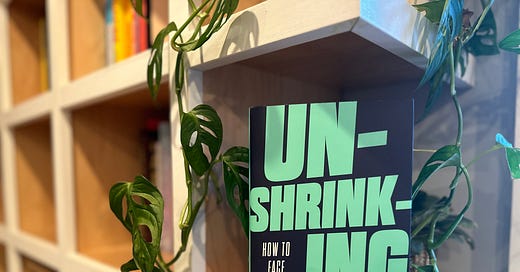
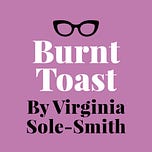


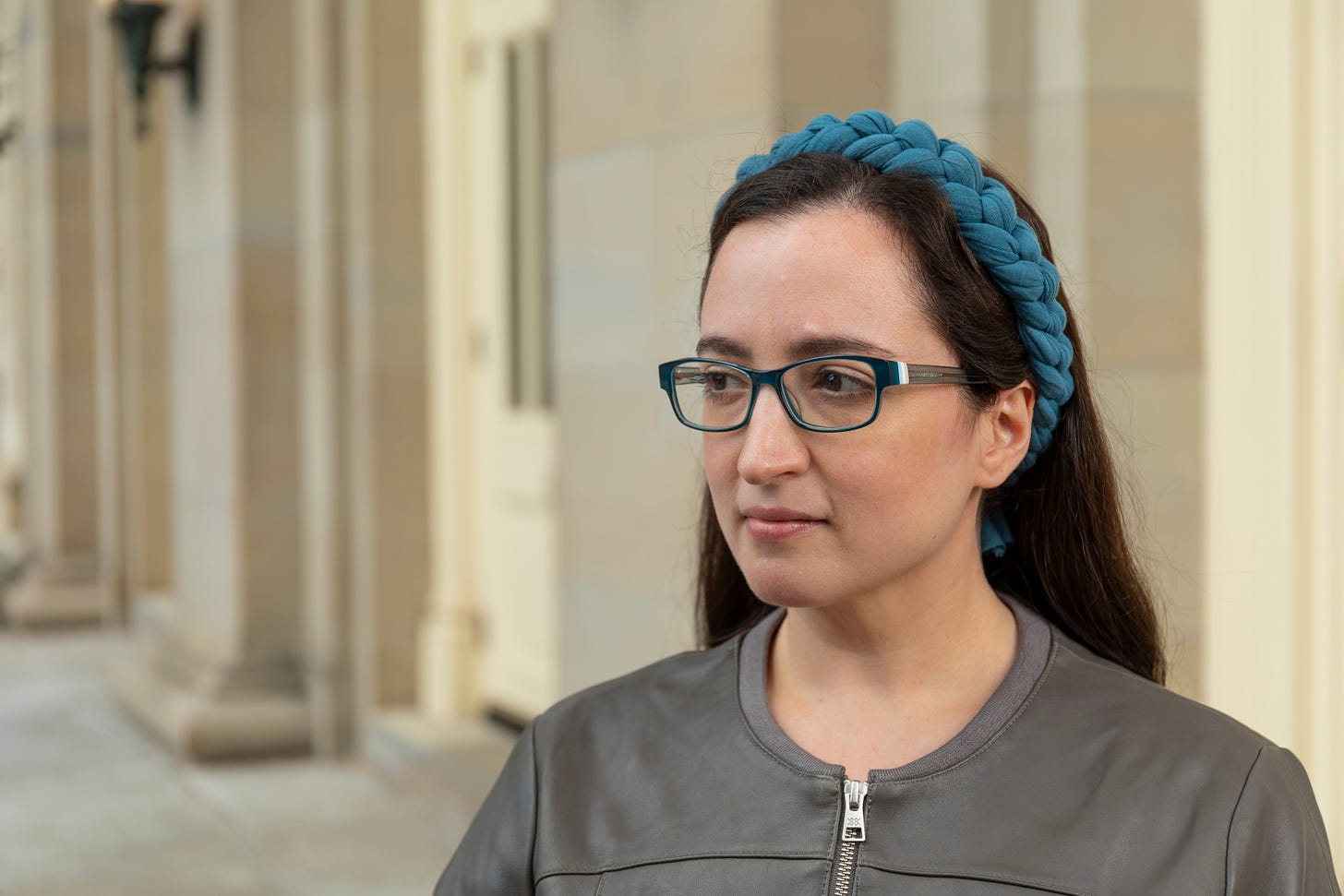



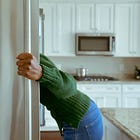





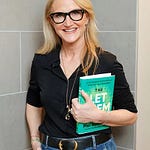
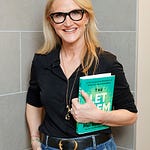


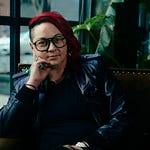

Share this post